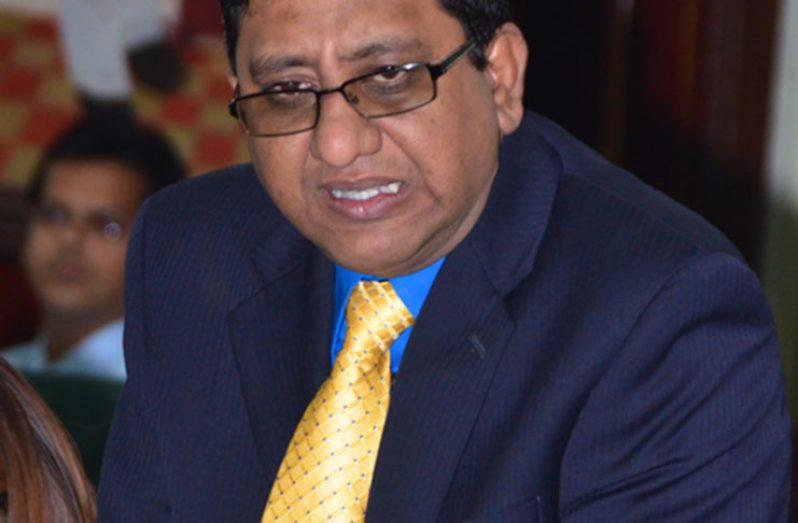THE acting Chief Justice Roxane George-Wiltshire, on Monday afternoon dismissed the Fixed Date Application that was filed by former Attorney General Anil Nandlall, challenging the validity of the charge he faces on the theft of the law books.
However, this ruling caused some controversy as Nandlall and his lawyer Devindra Kissoon, pointed out that the ruling should have been on the issue of jurisdiction, rather than the substantive matter.
Speaking to the media upon exiting the courtroom, Nandlall said, “the judge had asked us to persuade her on whether or not she has jurisdiction, and that’s all we set out to do. And, we did persuade her, and that was the only question we were asked to address. But the Learned Judge decided the entire case, which was not our expectation, which was not what we had argued… Our intention was to prove the issue of jurisdiction, after which we would have invited her to call up the evidence and then we would have addressed her on the evidence.”
RELATED STORY
In November of last year, a prima facie case was made out against Nandlall in relation to the alleged larceny of over $2 million worth of law books from the Ministry of Legal Affairs.
Nandlall and his counsel subsequently made an application for no case submission, on grounds that the prosecution did not sufficiently prove the legal threshold to establish the commission of the crime in the court of law.
He explained, that the books he is being accused of stealing were acquired during his term in office as attorney general and minister of legal affairs, and before his appointment, he requested the books as a condition of his service.
The presiding Magistrate Fabayo Azore, however, overruled Nandlall’s no case submission, which led him to file a fixed date application at the High Court. In his applications, Nandlall argued that the magistrate erred in law when she overruled his submission; that the offence of “Larceny by a Bailee contrary to Section 165 of the Criminal Law Offences Act, Chapter 8:01”, is not known to the Laws of Guyana.
He outlined in the document that the decision made by the magistrate is contrary to, and in violation of Articles 40, 144(4) and 149(d) of the Constitution of Guyana, unlawful, illegal, without and in excess of jurisdiction, erroneous in law, unreasonable, null, and void and of no effect.
And, he was therefore asking for a declaration that the charge is an offence unknown to the law, rendering it unlawful, illegal, null, void and of no effect, and as such, the magistrate has no jurisdiction to hear or continue to hear and determine it; an Order or Writ of Certiorari quashing the charge; a declaration that the magistrate committed an error of law in ruling that the prosecution established a case against him; a declaration that the magistrate committed an error of law by overruling the applicant’s no-case submission in respect of the offence and three Orders or Writs of Certiorari quashing the decisions made.
However, Special Organised Crime Unit’s (SOCU’s) lawyer, Leslyn Noble filed an affidavit in defence on behalf of Superintendent Trevor Reid, who is the second named respondent on Nandlall’s application, for which she raised several issues.
She raised that, the Judicial Review Act does not permit the applicant to file this application because judicial review is, a review of an administrative action and not a judicial action.
The magistrate, Noble said, would have acted in her judicial capacity, and as such, the High Court should not entertain his application.
Noble also argued that the court has no jurisdiction to entertain the application, on the ground that it stems from a trial that is ongoing in the Magistrate’s Court, and in addition to that, the trial is at an interlocutory stage.
Another contention was that the applicant did not produce any evidence or facts, that prove any breach of his constitutional rights as made out in his application.
Addressing all these contentions on Monday, citing several cases, Chief Justice George-Wiltshire first ruled that the High Court has supervisory jurisdiction to intervene in a matter that is ongoing in the Magistrate’s Court.
She further went on to say that jurisdiction, however, should only be exercised in limited and extreme circumstances. In these circumstances, the CJ pointed out that the applicant did not establish what constitutional breach he will be exposed to.
With regards to the charge of Larceny by Bailee, the CJ highlighted that even though Larceny by Bailee is an offence that is unknown in the UK, it is a proper charge under Section 165 of the Criminal Law Offences Act of Guyana.
Hence, the charges are not bad in law, thus there is no need for the records in the proceedings at the Magistrate’s Court to be produced in the High Court, because Nandlall did not establish that he is experiencing a breach of his constitution and fundamental rights.
It was then the ruling was passed dismissing the application. This means that the magistrate can proceed with the criminal trial.
The former AG said that he will be heading to the Appellate Court, to appeal the decision of the chief justice, maintaining that he did not have a chance to address the substantive matter since he was directed to address the issue of jurisdiction that was raised by the respondents.



.jpg)









